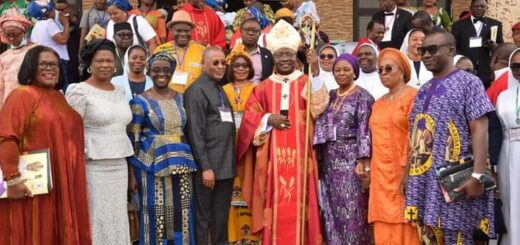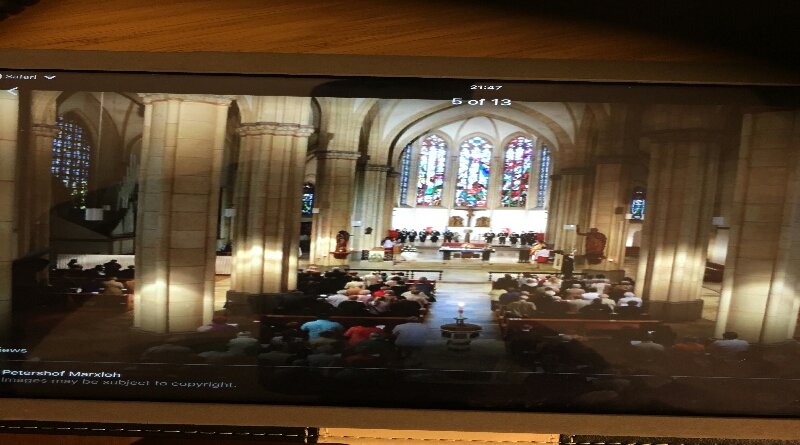Reflection on the commandments of God and the genuineness with which we practice our religion
by ARCH BISHOP · August 8, 2021
TWENTY SECOND SUNDAY, YEAR B, AUGUST 29, 2021, ST. AUGUSTINE’S PASTORAL AREA, WARU, ABUJA, HOMILY BY ARCHBISHOP I. A. KAIGAMA
READINGS: Deut. 4: 1-2, 6-8; Ps. 14(15): 2-5; Jas. 1: 17-18, 21-22, 27; Mk. 7: 1-8, 14-15, 21-23
Today, the readings invite us to reflect on the commandments of God and the genuineness with which we practice our religion. We are enjoined to have a strong desire for interior spiritual growth rather than exterior piety, camouflaged with mere rituals or customs. Our practice of religion should not be geared towards seeking worldly praise, approval, applause or mere geographical expansion of territory or increase in the numbers of adherents, but should spur us towards the path of purity of heart, compassion and genuine human feelings for one another.
The first reading from Deuteronomy contains the farewell address of Moses to the people of Israel as they were preparing to take possession of the Promised Land. Moses’ emphasis was on obedience to Yahweh and fidelity in keeping His laws in order to possess the land and to gain God’s favour. Importantly, he warned them not to add or remove anything from God’s commandments. However, the Pharisees would later multiply the Ten Commandments to about six hundred and thirteen legal codes, thus making religious practice very difficult for the people.
Religion is more than external ritualistic observances; it is about having a loving relationship with God and respect for other human beings, and finding the true meaning of life. The psalm describes the one who practices true religion as blameless and just (cf. Ps. 15).
Our respective religions should seek to promote the dignity, sanctity and sacredness of human life. The violence, bloodshed, and gruesome attacks experienced even most recently in parts of our dear country are a terrible embarrassment to our nation and a tragic contradiction to the tenets of both Christianity and Islam.
In the second reading, St. James reinforces the idea of true religion by saying that true religion entails visiting orphans and widows in their sufferings, and not to be defiled by this world (cf. Jas. 1:27). In our country instead, terrorists, bandits, kidnappers and other criminals make life more difficult for orphans and multiply the number of widows by killing their men. Some anti-social elements go as far as cutting down food crops, while claiming to be observers of religious rules and customs. Such observances are sterile.
There is so much religiosity among practitioners of Christianity and Islam, but little piety with little demonstration of unconditional charity towards fellow human beings, irrespective of religion or ethnicity.
Unfortunately, some in the political class have exploited religion for selfish political and economic advantages. Even worse, some religious leaders make inciting comments to keep religious adherents in constant inter-religious hostility. No civilized religion encourages its adherents to fight for God. When we fight and kill in the name of religion, it is often out of selfish interests. Sponsoring or killing a fellow human being in the name of religion is an evil we must condemn even when the perpetrators are members of our own religious circle. This will improve peaceful coexistence and inter-religious harmony. The blame game must give way to forgiveness, reconciliation, collective witness to social justice, peace and love.
It is also unfortunate that well-meaning Nigerians, who boldly speak out in favour of what is right, and make objective diagnosis of burning national issues, are threatened. The Bishops, rising from the plenary meeting held in Enugu, 19th – 27th August, have spoken again on various issues: the needless killings, deficient security, youth unemployment, poverty, the bastardization of human life, etc. The Government should interpret our concerns positively as a patriotic contribution to the current national issues to be urgently acted upon rather than see them as a challenge to political authority.
The world is watching Nigeria with great bewilderment. The reprehensible killings and related crimes, no matter the perceived grievances, are a call to Government to act proactively and definitively.
The attitude of the Pharisees and Scribes which earned them the rebuke and denunciation from Jesus is because they honoured God with their lips, while their hearts were far from Him. Their worship founded on externalism hardly translated into productive harmony, peace, faithfulness or forgiveness.
What the Lord wants from us today is a genuine life of grace and true holiness. We cannot go on worshipping God with the praises and prayers of our lips when our hearts are far away from Him. We must “live in the presence of God” through a constant conversion of heart.
By saying in the Gospel that: “What comes out of a man is what defiles him”, Christ calls us to self-evaluation. Malicious intentions, hatred, pride, corrupt practices and other vices that sour our relationship with God and neighbours must give way because they are obstacles to our faith journey.
As we joyfully confirm today 144 candidates, celebrate 18 weddings and 104 people receiving Holy Communion for the first time, the focus should not be on mere numbers but on the quality of witness to Christ in our society.
I bring you Fr. Lawrence Tajah and all the parishioners of St. Augustine, Waru, greetings and blessings from the Catholic Bishops of Nigeria who concluded their plenary in Enugu on Friday. Let us join the Bishops to pray more fervently that God will intervene in our country to bless us with safety and prosperity as we worship Him in truth and in spirit (cf. Jn. 4:23-24), and allow the “righteousness” of Nigerians to exalt our dear nation (cf. Prov. 14:34).




